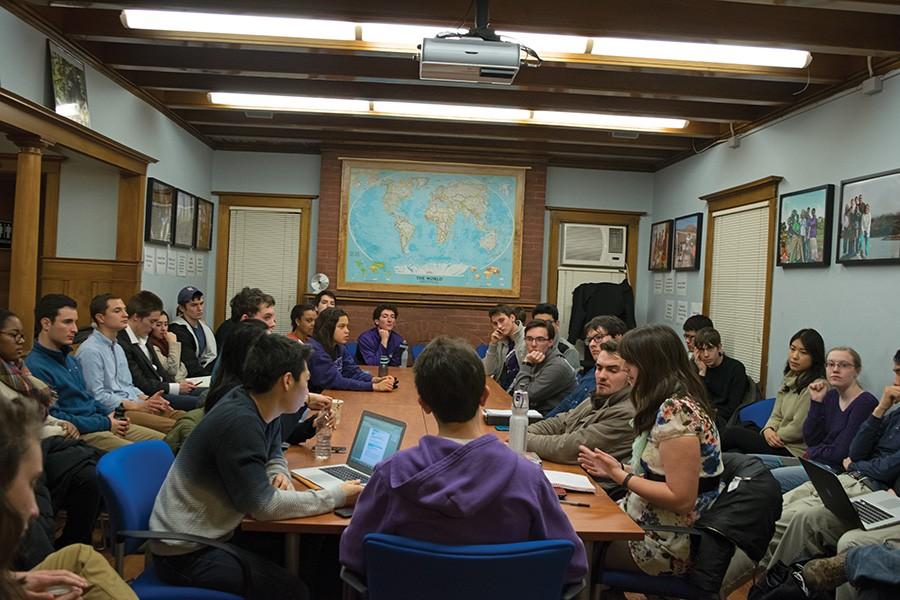Political Union debates political correctness on campus
Lauren Duquette/Daily Senior Staffer
Political Union debates the impact of political correctness on college campuses. More than 30 students came to the Buffett Institute to discuss the topic.
January 26, 2016
About 30 students joined a Political Union debate Monday to argue the premise that political correctness on college campuses hinders learning.
The debate, located at The Buffett Institute, started with opening remarks from Weinberg junior Lauren Thomas, who argued for the resolution which stated political correctness on college campuses impedes learning, and Weinberg junior Wooyoung Lee, who argued against the resolution. Attendees could then contribute in a moderated debate with final remarks and voting at the end. The debate ended in a tie with 14 voting in favor, 14 voting against and four abstentions.
Thomas said the current stream of political correctness on college campuses can stifle constructive conversation and is essentially illiberal. She said it is important to hear other points of view and be able to combat them with facts if they are problematic.
“I personally like to be politically correct, but that doesn’t mean I think everyone on campus should be forced to be politically correct,” Thomas said. “Banning ideas, which is what a lot of strains of political correctness are trying to do, does not make them go away. Only engaging those ideas and demonstrating why they’re wrong will make them go away.”
Political correctness is also not a question of the truth so much as a question of what opinion is currently popular, said Weinberg junior Kyle Varwig, who gave the closing remarks for the affirmative. Dictating what people can and cannot say simply allows unpopular thoughts to remain unsaid and thrive in people’s private thoughts, he said.
“Looking at it definitionally, political correctness is whatever opinions are politically optimal. It’s whatever essentially polls well,” Varwig said. “Political correctness doesn’t actually silence the ideas … they just keep them in their head where they grow and fester.”
Political correctness, however, is not antithetical to constructive conversation, Lee said. Rather, it provides the medium to have constructive conversation in a respectful manner.
By providing respectful discourse, communities traditionally left out of conversations now have a way of participating, he said.
“It is the way you express an idea, not the idea itself,” Lee said. “We’re still discussing it… (but political correctness) expands the conversation to include more people who would not be open to taking part in a conversation if it weren’t there before.”
Discussing political correctness also encourages conversation on contemporary forms of oppression, said Weinberg sophomore Max Rowe.
“One of the primary goals is to show racism still exists, sexism still exists,” Rowe said. “You can see the movement’s entire point as illuminating. … In a society that isn’t openly and self evidently racist and sexist, (political correctness) illuminates the ways that it still is.”
Karna Nangia, Political Union co-president, said she found the debate constructive. It was the first time Political Union tackled a similar issue since a 2012 debate on affirmative action.
“There are people on this campus doing really great work and taking action on the stuff that we talked about,” the Weinberg senior said. “It’s really interesting to hear the range of ideas and thoughts and the constructive dialogue that we had.”
Correction: A previous version of this story misstated Wooyoung Lee’s year. Lee is a Weinberg junior. The Daily regrets the error.
Email: [email protected]
Twitter: @matthewchoi2018


